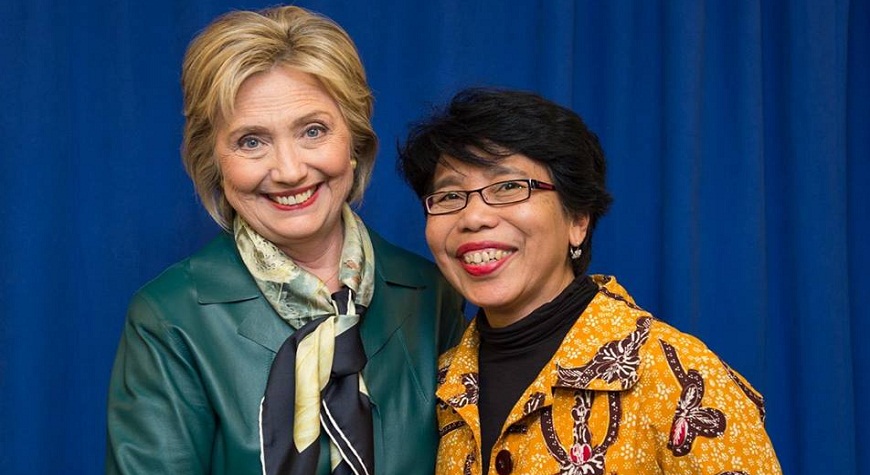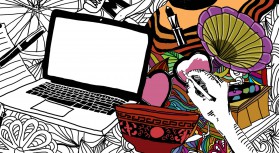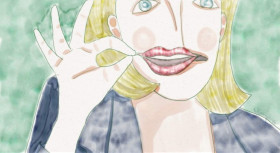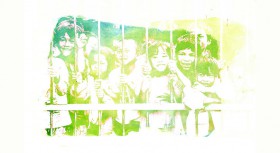Growing up in Indonesia in the late ‘60s and ‘70s, Dewita Soeharjono was surrounded by uncles who were political activists. Four decades later she, too, found her passion in politics, but on the other side of the world, in her adoptive country the United States.
Dewita lives in Arlington, Virginia, just a 15-minute drive from downtown Washington DC, where she makes a living consulting businesses on trends and digital sustainability. But she is most known in her community for her years of advocacy within the Asian American community, encouraging them to become part of the local and national political process.
She is the President of Democratic Asian Americans of Virginia (DAAV), which is a recognized caucus in the Democratic Party. On the weekend of June 18 she was one of the people running for national delegates who will represent Virginia in the Democratic National Convention (DNC) to choose the presidential candidate on July 25-28 in Philadelphia.
She is not the only Indonesian Americans in this part of the country who are active in the US politics. In the neighboring state of Maryland financial manager Nadia Syahmalina, 34, joined a few Muslims activists to cofound the Muslim Democratic Club of the Montgomery County in 2014. Last April she, too, ran in the Maryland Primary to become a delegate for Hillary Clinton in July’s DNC, making her the first Indonesian American on any electoral ballot in Maryland, and the first Muslim in the state’s District Six on the ballot.
The two did not win the elections in their respective states, but their engagement shows that in the US, politics does not belong only to those born and bred in the country. Both women were naturalized citizens. The involvement of people from migrant communities like them in this election year has become even more crucial at a time when one of the presidential contenders, the Republican presumptive nominee Donald Trump, is a nativist whose soaring popularity owes to his incendiary anti-immigrant and anti-Muslim rhetoric.
The Trigger
“When I realized how passionate I was about politics, I traced my family lineage, and saw that there were already seeds of political activism in my family,” Dewita told me in an interview conducted in DC. One of her uncles is Dorodjatun Kuntjoro-Jakti, who is former chief economic minister and former Indonesian Ambassador to the US, she said.
Dewita has an electric energy. She is relaxed but sparky at the same time, and she talks about politics in that geeky obsessive way a soccer enthusiast would about the English Premiere League. And she is a proud Democrat.
“Democratic values are my values. They care about people,” she said of the party of her choice.
Dewita first arrived in the United States in 1984, when she taught the Indonesian language at Cornell University for two years. Six years later she left for the States again, this time to Virginia, after winning the Green Card lottery. But it was in 2003 that she decided to become a US citizen, mainly because she wanted to vote then President George W. Bush out of office in the coming election year.
“I was really angry and fed up with Bush, and, at the same time, I also felt that not being a citizen limited my rights in the US. Some positions are only for US citizens,” she said.
“At the time I thought rather than being angry all the time about Bush attacking Iraq, I better find an outlet,” she said. Ironically it was Bush who signed her naturalization paper, she added, chuckling.
"Politicians only see us when we vote. Voting is power.”
So she joined the progressive advocacy group Moveon.org and became a volunteer for Howard Dean’s campaign. She did a variety of things, from canvassing, phone banking, fundraising to online organizing. She soon became a precinct captain of Arlington County Democratic Committee, overseeing 200-300 homes. Her duty was to recruit volunteers, who, among others, would canvas, drop literature on the candidate at people’s homes, and get supporters to put up yard signs at their homes.
It was during this time that she became connected to Asians for Howard Dean network and from there they established the Asian Pacific American for Progress, a network of activists of Asia Pacific descend.
“I thought I could make more impact if I worked with Asians,” she said. Thus began her complete plunge into the machinery of American politics, supporting Democratic candidates in local to presidential elections.
Nadia’s path was slightly different. It was witnessing the brutal riots in Jakarta in May 1998 that switched on her political awareness and nourished her love for community work. Born and raised in Indonesia until the age of six, when her family moved to the US, she was 16 when her mom decided to return to Jakarta.
She was attending an Indonesian school and was living a typical teenager life, when the 1998 riots broke out in Jakarta. Watching the city engulfed in fires, and torn by unrest and looting on CNN, she waited at home in fear for her mom, who had difficulties going home from her office downtown.
“I saw injustice. I had wanted to take part in what happened, to go to the street, but I wasn’t allowed. My mom said it wouldn’t be wise because I was just a young girl, and one who spoke Indonesian with an American accent,” she said.
A few months later she and her mom returned to the US, where her father was living, and the family has since migrated there permanently. But she was forever changed. Though softly spoken, there is an intensity about her that betrays a passion to make change.
“1998 changed me – from a typical teenager I became an intense teenager,” she said, with a sheepish grin. For one, it piqued her interest in community activism.
To continue her connection with her motherland, she became active in the Indonesian community, where she could keep track of what was going on at home and contribute however she could. There are about 1,500 Indonesians in the immediate DC area, and about 6,000 in the Maryland and Virginia states. Until recently, she was the Vice President in Indonesian American Association.
Later she joined the Indonesian Muslim Association in America (IMAAM), which provides spiritual needs of Indonesian Muslims in Washington DC and the surrounding areas. Nadia was in charge of the youth program, drawing from her experience of being a third-culture kids.
“You’re in the US, but not an American – but in Indonesia, you’re not quite Indonesian. I have learned that there are different ways of acclimatizing to a new culture, a type of acculturation,” she said.
In 2008 after giving birth to her son, she decided to become a US citizen.
“Having my son made me think that I really wanted to be rooted somewhere. Before that I had been living in America, but I wasn’t an American,” said Nadia, who now has two children, her youngest being a two-year old.
Then two years ago, she was approached by political activist Hamza Khan, who was seeking to increase civic engagement within the Muslim community and to have better representation of them in politics. Having once wanted to major in political science only to be disillusioned with politics later, Nadia thought it was the right time to become active in politics.
Together with Khan and a few other activists, she established the Muslim Democratic Club of Montgomery County in 2015 to enfranchise Muslim community, so they realize the importance of being civically engaged.
“I discovered the other side of politics: that it is not dirty, that it is grassroots movement with ties to the community. It is basically community activism, which has always been my passion.”

Nadia Syahmalina with former President Bill Clinton.
Engaging the Community
The Democratic Asian Americans of Virginia (DAAV) later evolved to become a constituency group within the Democratic Party of Virginia, which gave them the recognition and the rights to attend party meetings. And in 2013 its status was further upgraded into a caucus, which basically gives them more rights within the state party and congressional district committee.
Starting out with 20 people, DAAV now has 120 volunteers. Its missions are to educate Asian communities on political participations, empower Asian Americans to run for office and help elect democrats.
Asides from encouraging Asians to vote, DAAV helps Asians win elections. It also helps congressional candidates reach out to Asian communities, helping them with strategies and to recruit volunteers, targeting neighborhoods with a sizable Asian population.
“Asian communities are not very active politically, only about 50 percent of the population are registered to vote. A lot of Asian Americans don’t want to be involved in politics, because they don’t understand the system or because of language barrier,” she said.
That results in Asians being underrepresented in Virginia, where one in nine people are immigrants and where Asians make up nearly six percent of the population, according to American Immigration Council. Half of the migrants are naturalized citizens and are potential voters and 17 percent of all business owners in Virginia are foreign born, bringing in about US$3 billion in total business income. Currently there is only one State House Delegate of Asian descend, a Democrat.
Every year, there is an election, whether to elect the school board, the state or national legislature, the governor, or the President, and DAAV is involved in all of them. Dewita said many in the Asian communities don’t realize the importance of local elections, which affect them more than federal election. This means they do not have people in power who represent their interests. For example, education is among the most important issue among Asian Americans – the others being health care and small business – but many don’t realize that the school board election will determine education policies in their areas.
“If Asian people don’t vote, then they are invisible,” she said. “Politicians only see us when we vote. Voting is power.”
Within the Muslim community, there is a perception that politics is dirty and corrupt, Nadia said. In Montgomery country, which has about 1 million people, Muslims make up about 12 percent of the population, the large portion of whom are South Asians or Middle Easterners.
Said Nadia: “Research shows that 85 percent Muslims in the US are passionate about politics, but don’t want to get involved because of the negative portrayal of them and there’s nothing they can do to change it.”
The biggest concern among Muslims are Islamophobia, that “big elephant in the room” that is “going to eat us from within, unless we combat it,” said Nadia.
“Even if we don’t directly encounter it, you experience Islamophobia through what you watch or read – and all of it chips away at your sense of personal safety,” she said.
"My involvement is to get this point across, that not every Muslim wears veil, and that the community is diverse, economically and socially.”
The Muslim Democratic Club of Montgomery County organized its first congressional forum last April at the IMAAM Center. Eight legislative candidates (six from Democrats, one Republican and one from Green Party) spoke at the event attended by some 70 people from the community.
“At the end of the event a lot of the older generation people came up to me and thanked me. They said they needed more events like it. They needed to be connected to representatives to show that we have a voice and that we’re not just a caricature or the negative portrayal in the media,” said Nadia.
This is the reason why she thought it was important to become politically active by showing the diversity of the Muslim community and the contribution it makes to society.
“My involvement is to get this point across, that not every Muslim wears veil, and that the community is diverse, economically and socially,” said Nadia, who does not wear the hijab.
Why Hillary
Both Dewita and Nadia support the presumptive Democratic nominee Hillary Clinton for the same reason: her work in the healthcare system, particularly the fact that she was one of the architects of Children’s Health Insurance Program (CHIP). Supported by the then first lady during her husband Bill Clinton’s term, the program provides assistance to children in families with incomes that are modest, but too high to qualify for Medicare.
“CHIP basically saved my son’s life,” said Nadia.
At nine months old, her elder son got severely ill and had to have a major surgery to remove a growth that was blocking his airways. Her husband had just lost a job at the time, and she, too, was unemployed. They had no health insurance for the baby.
“I researched online and came across information on CHIP, and that enabled my son to have the surgery,” she said. “Hillary showed to me that she was very passionate about children and welfare at a time when she wasn’t even vying for political office."
Dewita said she was undecided until she attended a panel discussion and saw how emotional Bernie Sanders got.
“I don’t like his temperament and I don’t think his policies make sense too. The math just doesn’t add up,” she said.
She also noted that Clinton has been very close with the Asian community for a long time, as any presidential contender should be.
“You know, immigrants are the future of America. After this election, no one race will be a majority in the US.”
Are other Indonesian Americans like them? Not likely. Most Indonesian Americans are not very political, Dewita said, unlike Indian Americans, who are now the largest Asian groups in the US and who happen to be more political than any other Asian ethnics.
The two credit their involvements to the strong climate of volunteerism in the US, where many people are accustomed to volunteering for political, social and economic justice, and immigration causes. Nadia proudly recounted her nine-year old’s first volunteering experience recently.
Although they were not elected to become delegates in July’s DNC (but Dewita was picked as a member of standing committee, so she will still be there), they vowed to never stop their activism – but not necessarily to run for political office.
“I’m more excited about doing something that makes an impact, working from the outside, “ said Dewita.
Nadia expressed similar sentiment: “I love activism and meeting people, though I’m not into ‘vote for me’ type of thing. But I know what happens if you sit on the side while things are happening, like when I was in Indonesia.”
She recalled being in an event recently where former President Bill Clinton gave a talk to inspire people to be more politically active.
“He said, ‘you know, this is a historical election, where the options are two candidates: one who is passionate about building bridges and one who is passionate about building walls.’”
That, to her, is a clear choice to do what she has to do.
Read Devi’s piece on rape culture in Indonesia and follow@dasmaran on Twitter.
Photos courtesy of Dewita Soeharjono, Hasan Mansori, Adrian Kadir and Sherif Kadir.








Comments